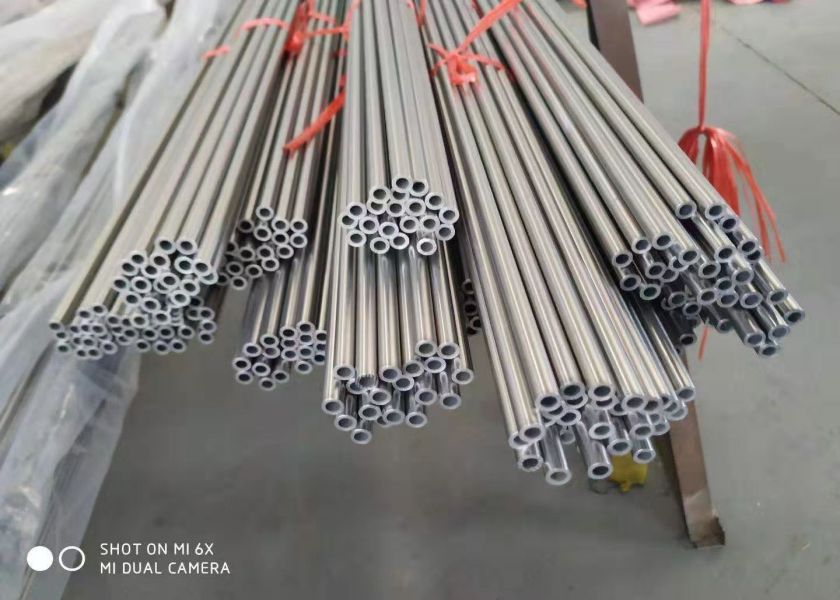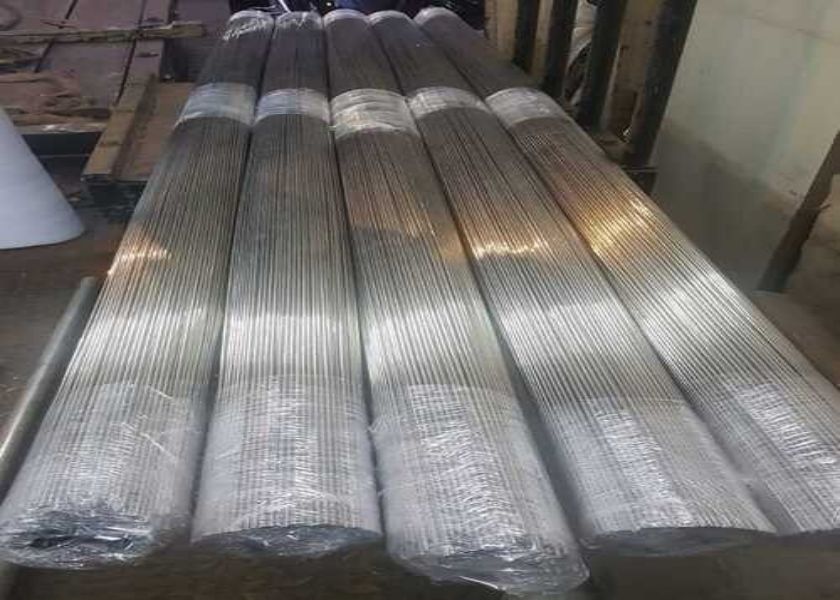316L stainless steel 6.25*0.8mm coiled tubing capillary tubing
UNS – S31600 / S31609 / S31603 / S31635
316L stainless steel 6.25*0.8mm coiled tubing capillary tubing
Stainless Steel Grade 316 is an austenitic chromium-nickel stainless steel includes molybdenum. This addition increases corrosion resistance, enhances resistance to pitting chloride ion solutions and give expanded strength at high temperatures. Properties are same as to those of type 304 aside from that 316 are somewhat stronger at high temperatures. Corrosion resistance is enhanced, specifically against sulfuric, hydrochloric, acetic, formic and tartaric acids, acid sulphates and alkaline chlorides.
316L stainless steel 6.25*0.8mm coiled tubing capillary tubing
Stainless Steel Grade 316L is a low carbon austenitic chromium-nickel stainless steels with corrosion resistance same as type 316 however with resistance to intergranular corrosion following welding.
316L stainless steel 6.25*0.8mm coiled tubing capillary tubing
Stainless Steel Grade 316H is a higher carbon variation of 316 making the steel more suitable for use in applications where high temperatures are available. Balanced Grade 316Ti offers comparable qualities. The expanded carbon content delivers a greater tensile and yield strength. The austenitic structure of the material also gives this grade excellent toughness, even down to cryogenic temperatures.
316L stainless steel 6.25*0.8mm coiled tubing capillary tubing
Stainless Steel Grade 316Ti is Titanium balanced out austenitic chromium-nickel stainless steel includes molybdenum. This extension increases corrosion resistance, enhances resistance to pitting chloride ion solutions and give expanded strength at high temperatures. Properties are like those of type 316 with the exception of 316Ti because of its Titanium addition can be used at high sensitization temperatures. Corrosion resistance is enhanced, especially against sulfuric, hydrochloric, acetic, formic and tartaric acids, acid sulphates and alkaline chlorides.
Characteristics
- Higher creep resistance
- Excellent formability.
- Rupture and tensile strength at high temperatures
- Corrosion and pitting resistance
316L stainless steel 6.25*0.8mm coiled tubing capillary tubing
Applications
- Food preparation equipment, especially in chloride environments
- Chemical processing, equipment
- Laboratory benches and equipment
- Rubber, plastics, pulp & paper machinery
- Pollution control equipment
- Boat fittings, value and pump trim
- Heat exchangers
- Pharmaceutical and textile industries
- Condensers, evaporators and tanks
316L stainless steel 6.25*0.8mm coiled tubing capillary tubing
Corrosion Resistance
Types 316 and 316L Stainless Steels display preferable corrosion resistance over Type 304. They provide superb pitting resistance and very good resistance to most chemicals involved in textile, the paper and photographic industries.
Machining
For work harden, slow speeds and heavy feeds will minimize this alloy’s tendency. Because of long stringy chips, the utilization of chip breakers is recommended. Many organizations now offer premium machinability grades, for example CarTech with their Project 70 and 7000 series.
Welding
316L stainless steel 6.25*0.8mm coiled tubing capillary tubing
All regular fusion and resistance process aside from oxyacetylene welding have proven successful. For getting the best result, it uses AWS E/ER316 or 316L filler metal.
Hot Working
All common hot working processis possible with this alloy. Heat to 2100-2300 F (1149-1260 C). Avoid working this material beneath 1700 F (927 C). For ideal corrosion resistance, a post-work annealing is recommended.
Cold Working
This alloy can be successfully performed with the help of shearing, stamping, heading and drawing. Post-work annealing is recommended to remove internal stresses.
Annealing
1850-2050 F (1010-1121 C) followed by fast cooling.
Hardening
This alloy doesn’t reply to heat treatment. Cold work will cause an increase in both hardness and strength.
Chemical Composition %
| Grade | C | Si | P | S | Cr | Mn | Ni | Cu | Mo | Ti | Fe |
| Alloy 316 | 0.08 max | 0.75 max | 0.045 max | 0.030 max | 16.0 – 18.0 | 2.0 max | 10.0 – 14.0 | - | 2.0 – 3.0 | - | Remainder |
| Alloy 316L | 0.03 max | 0.75 max | 0.045 max | 0.030 max | 16.0 – 18.0 | 2.0 max | 10.0 – 14.0 | - | 2.0 – 2.0 | - | Remainder |
| Alloy 316H | 0.04 – 0.10 | 0.75 max | 0.045 max | 0.030 max | 16.0 – 18.0 | 2.0 max | 10.0 – 14.0 | - | 2.0 – 3.0 | - | Remainder |
| Alloy 316Ti | 0.08 max | 1.0 max | 0.040 max | 0.030 max | 16.0 – 18.0 | 2.0 max | 10.0 – 14.0 | 0.075 max | 2.0 – 3.0 | 5 x (C+N) – 0.07 | Remainder |
Mechanical Properties
| Grade | Tensile Strength (ksi) | 0.2% Yield Strength (ksi) | Elongation% in 2 inches |
| 316 / 316H / 316Ti | 75 | 30 | 40 |
| 316L | 70 | 25 | 40 |
Physical Properties
| Units | Temperature in °C | |
| Density | 7.99 g/cm³ | Room |
| Specific Heat | 0.12 Kcal/kg.C | 22° |
| Melting Range | 1371 – 1421 °C | - |
| Modulus of Elasticity | 193 KN/mm² | 22° |
| Electrical Resistivity | 74 µΩ.cm | Room |
| Coefficient of Expansion | 16.0 µm/m °C | 20 – 100° |
| Thermal Conductivity | 16.2 W/m -°K | 100° |
ASTM Specifications
| Pipe / Tube (SMLS) | Sheet / Plate | Bar | Forging | Fitting |
| A 213, A 249 | A 167, A 240 | A 276 | A 182 | A 403 |








